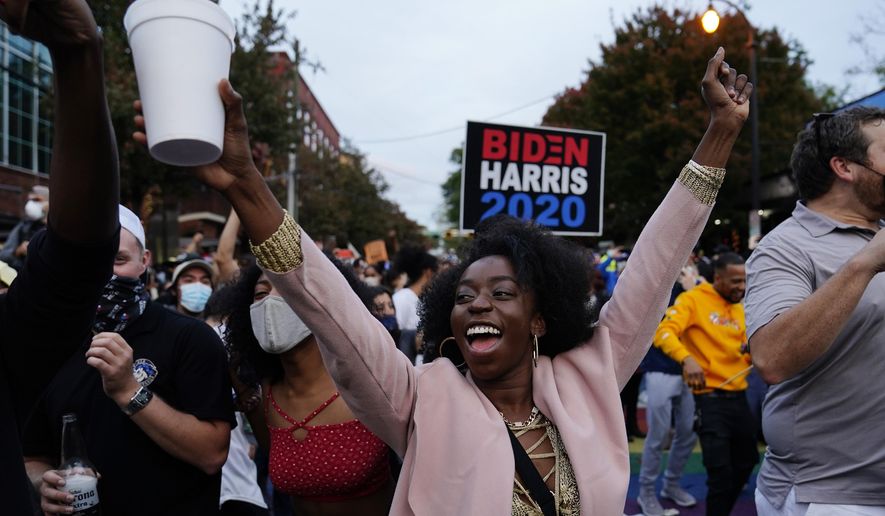Is Georgia turning blue?
That’s been the question for years as Democrats steadily narrowed the gap in statewide elections.
Now, with several news outlets projecting a Georgia win for presumptive President-elect Joseph R. Biden, voters may finally be aligning — or realigning — with the claims.
The last time a Democrat won Georgia in a presidential election was Bill Clinton in 1992.
“We’re Lucy with the football,” Democratic activist Stacey Abrams, a former majority leader in the Georgia House of Representatives, told Stephen Colbert on his late-night talk show. “I think people keep waiting for this massive change. It’s going to happen incrementally and it’s happening now.”
Ms. Abrams has worked hard to bring it about. For the last two years, she organized and rallied voters after losing the Georgia gubernatorial race, refusing to concede and insisting Republican Brian Kemp stole the election.
The “field goal” that Ms. Abrams says Democrats finally kicked Nov. 3 isn’t officially through the uprights yet.
A recount is underway in the state’s presidential race, where Mr. Biden led President Trump by 0.3% in the unofficial tally. Some news organizations, including The Associated Press, have not called Georgia for Mr. Biden.
What’s more, Georgia’s two Senate races were forced into January runoffs that will eventually determine the partisan balance of power.
Republican incumbents enter those races with clear advantages because, well, it’s Georgia.
Sen. David Perdue’s 49.7% of the vote was within a whisker of the 50% needed to win outright.
Democrat Jon Ossoff was on his heels at 48% of the vote.
But Mr. Perdue got more votes than Mr. Trump in Georgia. He also finished ahead of Mr. Ossoff despite the Democrat out-fundraising him by $11 million.
The fact that Mr. Perdue is in a runoff at all should give the GOP pause.
“David Perdue is a rock-solid conservative incumbent and he ran a good race against a guy who really doesn’t have much to run on, no real accomplishments,” said Tim Phillips, a senior adviser with Americans for Prosperity Action, a conservative group that plans to be active on the ground in the runoffs.
“But in 2018 the Democrats came within a point of the governor’s office, the margins have been razor-thin in two consecutive elections,” Mr. Phillips said.
The most obvious explanation for Georgia trending blue is demographics. Nearly half of the state’s votes come from Atlanta and its suburbs, where the population of Black voters is growing and more White voters are going Democrat.
“It was never a question of if but when,” said Rick Dent, a veteran Georgia political consultant. “The demographic trends of the metro area have been moving toward blue for some time now. Couple that with aggressive voter registration activity and Trump accelerating movement toward Democrats in the suburbs and you have Biden winning the state.”
Mr. Dent puts the state at 50/50 today — making it more purple.
Democrats are pouring money into the Senate races to change those odds.
“I know this: Nobody spends $200 million on Senate races if they don’t think a state is absolutely in play and on the cusp of turning blue,” said Mr. Dent.
Conservatives are confident Georgia still leans red, according to Erick Erickson, the former head of RedState and now a talk radio host in Georgia.
“I thought the president would win — barely — and now it looks like he lost — barely,” said Mr. Erickson, who endorsed Mr. Trump this year after camping with NeverTrump Republicans in 2016.
“I think the state is still Republican but it is trending blue,” he said.
Mr. Erickson pointed to the vote tallies in the Senate races as evidence the GOP still holds an edge. Alongside Mr. Perdue on the ballot was Republican Sen. Kelly Loeffler, who was appointed to the seat in January.
Ms. Loeffler had to contend with a challenge on her right from Republican Rep. Doug Collins. The two split the GOP vote in the jungle primary to give the lead to Democrat Raphael Warnock. But the combined total of 2.25 million votes for Ms. Loeffler and Mr. Collins overshadowed the 1.6 million for Mr. Warnock.
Mr. Warnock was expected to garner around 40% of the vote, according to two late October polls. He held a commanding 15-point lead in the Real Clear Politics average of recent surveys heading into Election Day.
In the election, he got 32.9% for a 7-point edge over Ms. Loeffler.
Those numbers convinced some Republicans that the runoffs will come down to a get-out-the-vote effort more than persuasion. Whatever advantage they may have once enjoyed in Atlanta’s suburbs they can maintain by keeping the enthusiasm up in areas that remain solidly conservative.
The GOP should come together in that battle, although Mr. Erickson and others noted that Georgia Republicans are rife with interparty squabbles.
Democrats saw some gains in 2018 legislative races. While the State House remained in Republican hands in 2020, Speaker of the House David Ralston and Mr. Kemp often crossed political swords.
The effort to win control of the party within Georgia underlines the fact that despite a long run of victories in presidential races, Republican control is a relatively recent development. It was a major upset when Mr. Perdue beat Democratic incumbent Gov. Roy Barnes in 2002, and the GOP legislative majority came in 2005.
Conservative activists vow to keep that status in January.
“We do not consider Georgia a ’blue state’ and we are working hard to make sure that never happens,” said Jenny Beth Martin, a Georgia native and national coordinator for Tea Party Patriots Citizen Fund.
• James Varney can be reached at jvarney@washingtontimes.com.




Please read our comment policy before commenting.